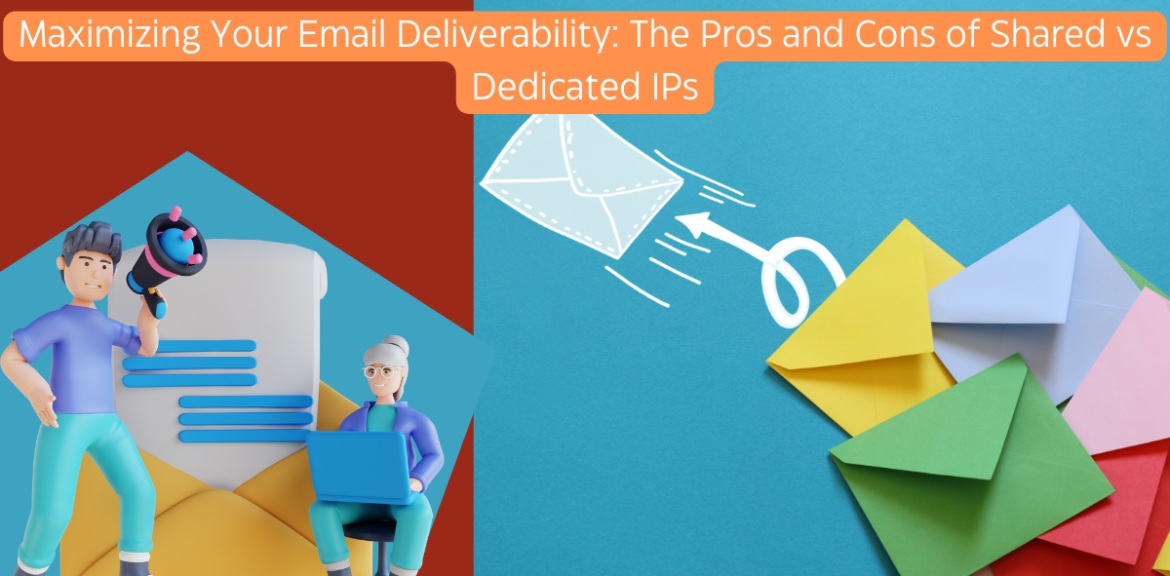As an email marketer, understanding the importance of email deliverability is key. You can have the best content, but if your emails never reach the intended recipients, it’s all for nothing. One of the key factors that affects email deliverability is the IP address your emails are sent from. In this article, we’ll explore the differences between shared and dedicated IPs, the pros and cons of each, and the best practices for email deliverability.
Introduction to email deliverability and IPs
Email deliverability, or the ability of an email to reach the intended recipient, is a critical factor in any email marketing campaign. Most email service providers (ESPs) use IP addresses to track and verify the emails sent from their servers. Each email sent from an ESP will be associated with a unique IP address, which can be either shared or dedicated.
Shared IPs are shared among multiple ESPs and customers. Dedicated IPs, on the other hand, are assigned to a single ESP or customer. The type of IP address used can have a significant effect on email deliverability, as well as the reputation of the sender.
What is a shared IP?
A shared IP address is an IP address that is used by multiple ESPs or customers. This type of IP address is ideal for smaller ESPs or those who don’t send a large volume of emails. The advantage of using a shared IP is that the sender’s reputation is not based on the actions of other users. However, it is important to note that the sender’s reputation can still be impacted by any malicious activity from other users.
What is a dedicated IP?
A dedicated IP address is an IP address that is assigned to a single ESP or customer. This type of IP address is ideal for larger ESPs or those who send a large volume of emails. With a dedicated IP, the sender’s reputation is not impacted by the actions of other users. However, it is important to note that the sender’s reputation can still be impacted by any malicious activity from the ESP itself.
Pros and cons of shared IPs
Shared IPs have both advantages and disadvantages. On the plus side, they are typically less expensive than dedicated IPs and can be used by multiple ESPs or customers. Additionally, they are ideal for smaller ESPs or those who don’t send a large volume of emails.
On the other hand, shared IPs can come with some drawbacks. Because they are shared by multiple ESPs and customers, the sender’s reputation can be impacted by the actions of other users. Additionally, it can be difficult to track the performance of individual emails sent from a shared IP.
Pros and cons of dedicated IPs
Dedicated IPs also have both advantages and disadvantages. On the plus side, they are ideal for larger ESPs or those who send a large volume of emails. Additionally, the sender’s reputation is not impacted by the actions of other users.
On the other hand, dedicated IPs can be more expensive than shared IPs and are only usable by a single ESP or customer. Additionally, it is important to note that the sender’s reputation can still be impacted by any malicious activity from the ESP itself.
Best practices for email deliverability
No matter which type of IP you choose, there are several best practices you should follow to ensure the best possible email deliverability. The most important practice is to ensure that you are only sending emails to people who have given you permission to do so. Additionally, you should always use double opt-in forms to verify the authenticity of the email addresses you are collecting.
You should also ensure that you are following the CAN-SPAM Act and any other applicable laws or regulations. Additionally, it is important to use email authentication protocols such as DKIM and SPF to protect your emails from being marked as spam. Finally, you should always monitor your IP address performance to ensure that your emails are being delivered as expected.
Strategies for choosing between a shared or dedicated IP
When deciding between a shared or dedicated IP, it is important to consider the size of your email list and the volume of emails you are sending. If you are a smaller ESP or are sending fewer than 10,000 emails per month, a shared IP is likely the best option.
However, if you are a larger ESP or are sending more than 10,000 emails per month, a dedicated IP is likely the better option. Additionally, if you are sending emails with sensitive content or are concerned about your reputation, a dedicated IP is likely the better option.
The importance of email authentication
When it comes to email deliverability, email authentication is critical. Email authentication protocols such as DKIM and SPF are designed to verify that an email is coming from a legitimate sender and is not a spam email. By using these authentication protocols, you can help ensure that your emails are delivered as expected and that they are not marked as spam.
Recommended tools for monitoring IP performance
Finally, it is important to monitor the performance of your IP address. There are several tools available to help you track the performance of your IP address, including email deliverability monitoring services and reputation monitoring services. These tools can help you identify any issues or trends with your IP address and help you take corrective action as needed.
Conclusion
Email deliverability is a critical factor in any email marketing campaign. When it comes to choosing an IP address, it is important to consider your needs and the size of your email list. In most cases, shared IPs are best for smaller ESPs or those who don’t send a large volume of emails. However, if you are a larger ESP or are sending more than 10,000 emails per month, a dedicated IP is likely the better option.
No matter which type of IP you choose, it is important to follow best practices for email deliverability and to use email authentication protocols such as DKIM and SPF. Additionally, it is important to monitor the performance of your IP address to ensure that your emails are being delivered as expected.
If you’re looking for an email marketing service and SMTP relay, try 171mails.com. With their powerful tools and services, they can help you maximize your email deliverability and ensure that your emails are reaching the right people.









